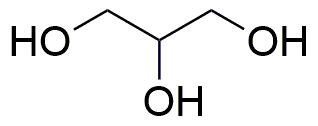Glycerol is widely utilized in research focused on:
- Pharmaceuticals: Glycerol serves as a key ingredient in many medicinal formulations, acting as a humectant and solvent. Its ability to retain moisture makes it ideal for cough syrups and topical ointments.
- Food Industry: Commonly used as a sweetener and preservative, glycerol enhances the texture and shelf life of food products. It is particularly beneficial in low-fat and sugar-free items, providing a sweet taste without the calories.
- Cosmetics and Personal Care: In skincare products, glycerol acts as a moisturizer, drawing water into the skin. Its non-toxic nature makes it suitable for sensitive skin formulations, enhancing product effectiveness.
- Biotechnology: Glycerol is crucial in cryopreservation, helping to protect cells and tissues during freezing processes. This application is vital for preserving biological samples and maintaining their viability.
- Industrial Applications: Used as a lubricant and antifreeze agent, glycerol improves the performance of various industrial processes. Its biodegradable nature also makes it an environmentally friendly alternative to petroleum-based products.
General Information
Properties
Safety and Regulations
Applications
Glycerol is widely utilized in research focused on:
- Pharmaceuticals: Glycerol serves as a key ingredient in many medicinal formulations, acting as a humectant and solvent. Its ability to retain moisture makes it ideal for cough syrups and topical ointments.
- Food Industry: Commonly used as a sweetener and preservative, glycerol enhances the texture and shelf life of food products. It is particularly beneficial in low-fat and sugar-free items, providing a sweet taste without the calories.
- Cosmetics and Personal Care: In skincare products, glycerol acts as a moisturizer, drawing water into the skin. Its non-toxic nature makes it suitable for sensitive skin formulations, enhancing product effectiveness.
- Biotechnology: Glycerol is crucial in cryopreservation, helping to protect cells and tissues during freezing processes. This application is vital for preserving biological samples and maintaining their viability.
- Industrial Applications: Used as a lubricant and antifreeze agent, glycerol improves the performance of various industrial processes. Its biodegradable nature also makes it an environmentally friendly alternative to petroleum-based products.
Documents
Safety Data Sheets (SDS)
The SDS provides comprehensive safety information on handling, storage, and disposal of the product.
Product Specification (PS)
The PS provides a comprehensive breakdown of the product’s properties, including chemical composition, physical state, purity, and storage requirements. It also details acceptable quality ranges and the product's intended applications.
Certificates of Analysis (COA)
Search for Certificates of Analysis (COA) by entering the products Lot Number. Lot and Batch Numbers can be found on a product’s label following the words ‘Lot’ or ‘Batch’.
*Catalog Number
*Lot Number
Certificates Of Origin (COO)
This COO confirms the country where the product was manufactured, and also details the materials and components used in it and whether it is derived from natural, synthetic, or other specific sources. This certificate may be required for customs, trade, and regulatory compliance.
*Catalog Number
*Lot Number
Safety Data Sheets (SDS)
The SDS provides comprehensive safety information on handling, storage, and disposal of the product.
DownloadProduct Specification (PS)
The PS provides a comprehensive breakdown of the product’s properties, including chemical composition, physical state, purity, and storage requirements. It also details acceptable quality ranges and the product's intended applications.
DownloadCertificates of Analysis (COA)
Search for Certificates of Analysis (COA) by entering the products Lot Number. Lot and Batch Numbers can be found on a product’s label following the words ‘Lot’ or ‘Batch’.
*Catalog Number
*Lot Number
Certificates Of Origin (COO)
This COO confirms the country where the product was manufactured, and also details the materials and components used in it and whether it is derived from natural, synthetic, or other specific sources. This certificate may be required for customs, trade, and regulatory compliance.

